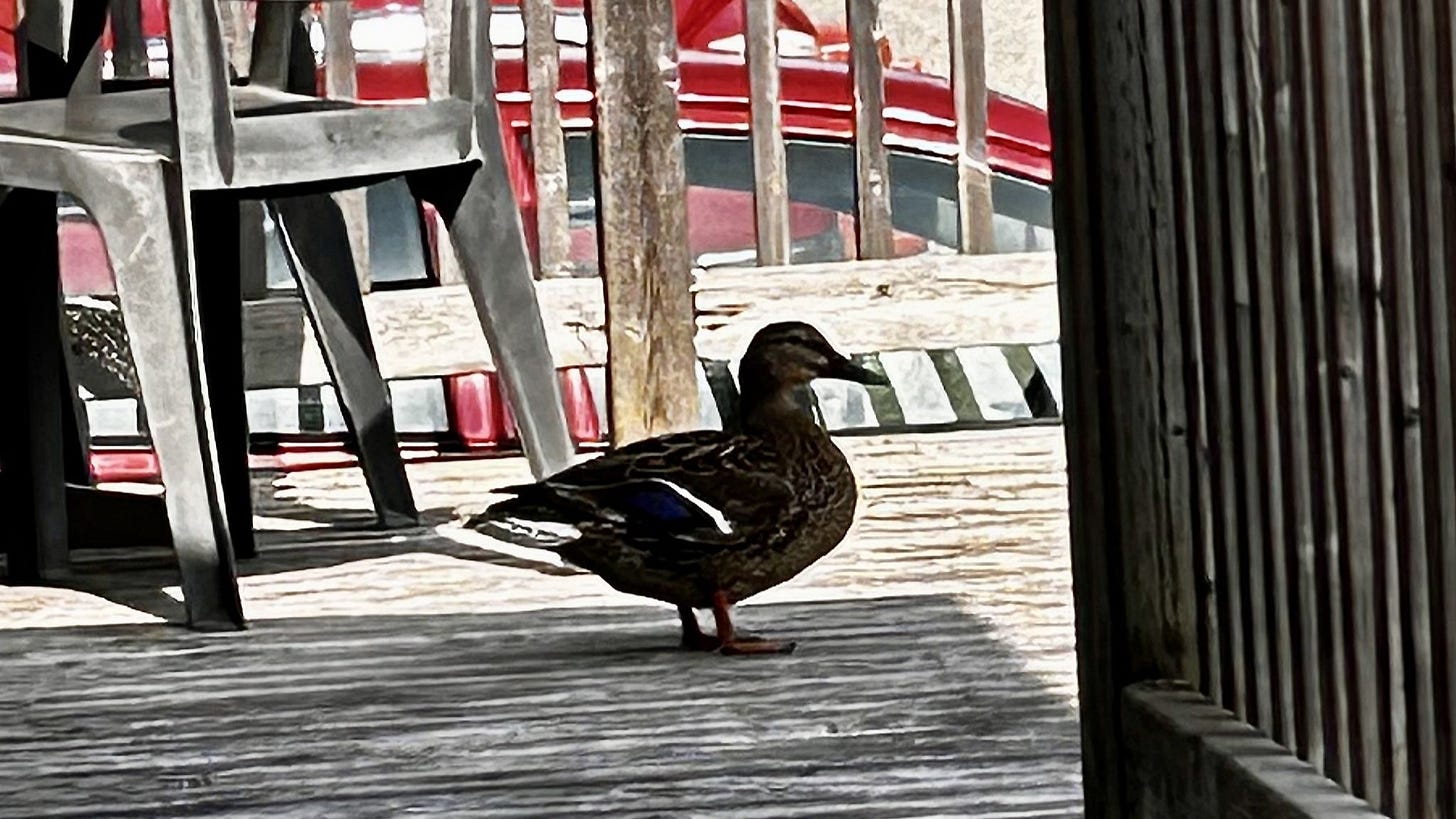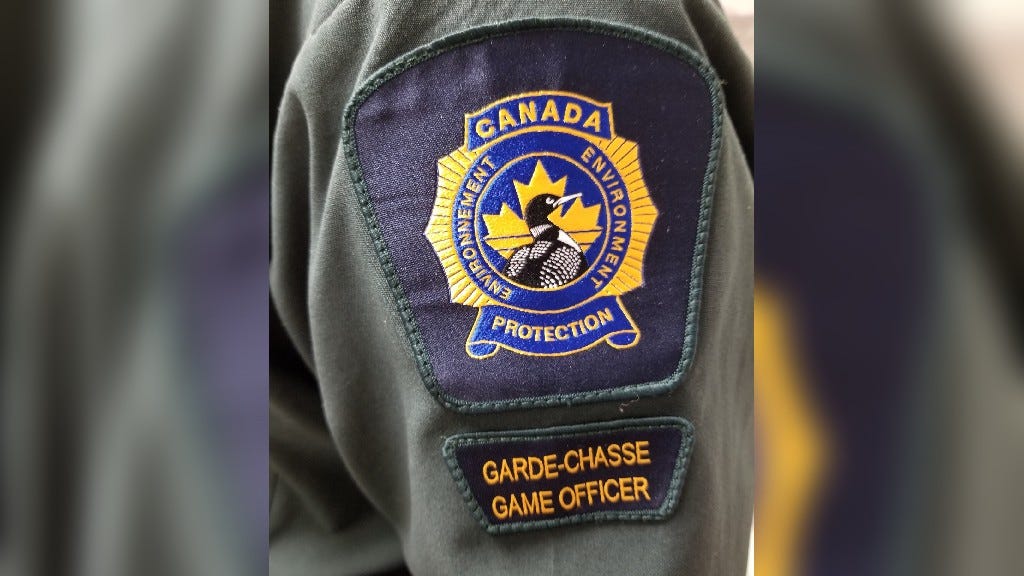Egg heist gives rise to awareness
Theft of some wild mallard eggs before they could hatch has people talking about need to protect nests, says wildlife stakeholder, and that’s a positive development
The unfortunate theft of several wild duck eggs from a downtown Fredericton restaurant has nevertheless sparked a welcome public discourse about the legal protections for birds and nests, says a wildlife advocate.
Several New Brunswick media outlets, including the Fredericton Independent, reported Monday and Tuesday about the surprising saga of a wild duck’s unusual nesting location: a planter on the patio of Isaac’s Way in the capital’s downtown core.
Restaurant owner Tabatha Smith said staff noticed a couple of unknown eggs in the planter a few weeks ago as they prepared to open the patio for the summer season, and before long, they realized a mallard had chosen that spot as her nest for her clutch.

Smith said she decided to keep the patio closed to protect the nest, and she obtained a permit last week to move the nest to a ground-level location.
The Nature Trust of New Brunswick has its offices in the same building as Isaac’s Way, and Smith turned to her neighbours for advice early on in the process.
“Tabatha was working hard to figure out what to do,” Bethany Pohl, stewardship manager with the nature trust, said Tuesday.
“We helped them get a permit from the Canadian Wildlife Service.”
She said a lot of people don’t realize there’s federal legislation that protects fowl and restricts what can be done with them and their nests.
“Migratory birds, which include ducks, geese and swans, are protected in Canada under the regulations of the Migratory Bird Convention Act,” Al Hansen, an expert with Environment and Climate Change Canada, told the Fredericton Independent on Tuesday.
“Under migratory bird regulations, Section 5(1)(b), no person must destroy, take or disturb an egg without a permit.”
Pohl said the restaurant and the nature advocacy group have pretty disparate purposes, so it was pleasant and interesting to get a chance to come together on the same project.
But on Sunday evening, what started out as an encouraging situation became a disconcerting one, when an unknown male was seen absconding with the eggs, placing them in a hat and then jumping into a vehicle that sped off from the scene.
“I don’t know why somebody would do that,” Pohl said.
Smith said Monday the theft has proven to be heartbreaking to the restaurant staff, as they’d become invested in the fate of the eggs.
Pohl said the nature trust was similarly interested in the outcome. She noted she saw the nest several times and took photos of it for the permitting process.
That a person made off with the eggs is surprising and upsetting, she said.
“It wasn’t even a natural predator,” Pohl said, adding if that had been the case, it would have been an understandable and natural outcome.
‘Not a good thing to do’
“I can only speculate on the motivations for somebody to take the eggs from this nesting mallard duck,” Hansen wrote in an email. “From a legal and a conservation perspective it was not a good thing to do.”
Eating the eggs wouldn’t be a viable option for the thief, he said, because the hen had already been incubating them, which means there were developing embryos inside them.
“If the person thought that they could continue to incubate the eggs and hatch out ducklings that they could then raise and keep as pets, it was not a good idea because in order to keep species in captivity you need to have an aviculture permit,” Hansen said.
“You would need to obtain your eggs or birds from another licensed aviculturalist because we would not allow mallards to be taken from the wild because there is a plentiful source of captive birds.”
That the incident occurred so early in the season comes as something of a relief, Pohl said, as there’s still time for the mother mallard to nest again elsewhere.
“She may be able to set up a new clutch somewhere,” she said, noting it’s common for wild birds to nest in urban areas, even a public space like the patio at Isaac’s Way.
Smith told the Fredericton Independent on Tuesday that she’s been informed the enforcement branch of the Canadian Wildlife Service, a division of Environment and Climate Change Canada, is investigating the theft.
Potential penalties
Hansen said there are two avenues for penalizing those who violate the Migratory Birds Convention Act.
The first is called an administrative monetary penalty - basically a fine - that doesn’t require the offender to go to court, he said.
The base amount is $400, he said, but that’s per egg, so hypothetically in this case, if nine eggs were taken, the fine would work out to $3,600.
“For more serious offences, charges would be laid and the matter would be brought before the courts,” Hansen said.
“Prosecutions under [the act] for an individual, summary conviction, first offence, are a minimum $5,000 up to $300,000 fine or imprisonment for a term not exceeding six months, or both.”

Such prosecutions can also lead to seizure and forfeiture of personal property, he said, such as vehicles, guns and boats - anything that was used in the commission of the offence.
“The penalties would be determined by a judge,” Hansen said.
While it’s unlikely we’ll never know what became of the eggs or why they were stolen, Pohl said, the silver lining of the theft is how it’s prompted a public conversation about wild birds, their nests and the restrictions designed to protect them.
A lot of people likely didn’t know they’re not supposed to disturb or move any birds’ nests, Pohl said.
Smith’s due diligence and efforts to get the right information led her to get the permit and do the right things to protect the duck eggs, the nature trust manager said.
Since the public learned about what Smith and the restaurant staff did, she said, it’s raised awareness about people’s responsibilities under federal legislation and what they can do to help nature co-exist with humanity in the 21st century.
Hansen said with the guidance that Smith and her staff received from the relevant agencies, they were really making a difference.
“The nesting hen had accepted the movement of the planter and had not abandoned the nest. That was a positive news story,” he said Tuesday
That makes “the illegal and irresponsible activities” of the person who made off with the eggs all the more disappointing, Hansen said.
The tale of the efforts to relocate the nest responsibly and the subsequent offence of the mystery perpetrator offer the chance to educate the public about how the nests and eggs of migratory birds are protected by federal legislation, he said, and to inform people about what to do when they encounter a nest.
“If people find a nest on their property, please don’t go near it for the time period that it is occupied,” Hansen wrote.
“Let the eggs hatch and the young to leave the nest. It is a relatively short period of time, and watching from a distance with binoculars can be fascinating.”
He noted that if a nest is causing damage or some kind of danger, people can contact the Canadian Wildlife Service for advice.
Don MacPherson can be contacted at ftonindependent@gmail.com.





It is puzzling why someone would take the eggs.